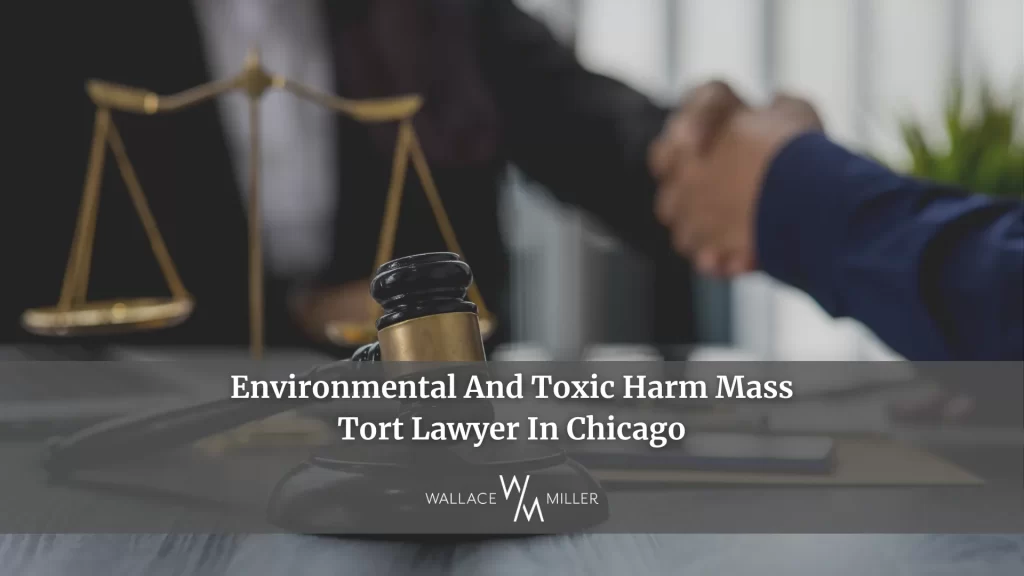
If you developed a medical condition from exposure to an environmental hazard or toxic substance, contact the product defect and mass tort litigation attorneys of Wallace Miller immediately. You might be entitled to compensation from the negligent party that exposed you to dangerous conditions. We could represent you in your case if you’re eligible to join a mass tort lawsuit.
Substances such as asbestos and carbon monoxide are toxic to humans and can cause various medical issues if exposure occurs. Environmental and toxic chemicals can lead to injuries, diseases, and death, especially after prolonged or frequent exposure. Unfortunately, some conditions don’t cause immediate symptoms. The adverse effects might not be apparent until years or decades pass.
At Wallace Miller, we understand how traumatic it can be to discover that a toxic substance or environmental hazard has put your health and life at risk. You weren’t aware of the harmful effects of exposure. Now you face medical treatment for the illness or injury you sustained. Our environmental and toxic harm mass tort lawyers are ready to help you hold the negligent party liable. We will fight by your side for justice and seek the maximum possible compensation on your behalf.
Call Wallace Miller at (312) 261-6193 today for your free consultation. We will determine whether you qualify for a mass tort lawsuit and advise you about the available legal options.
Groups at Risk of Toxic or Environmental Exposure
Specific individuals and groups of people are at a higher risk of exposure to toxic chemicals than other people. Many high-risk people are in occupations that require handling or being around these dangerous substances.
The most common groups at risk of toxic exposure include:
- Welders
- Oil Rig Workers
- Farmers
- Healthcare Professionals
- Commercial Painters
- Sanitation Workers
- Miners
- Refinery Employees
- Maritime Workers
- Auto Repair Employees
- Manufacturing Employees
- Construction Workers
High-risk groups aren’t the only people who can suffer toxic harm. Dangerous chemicals often end up in the air, food, and drinking water. Exposure can occur if someone lives near an oil refinery, drinks contaminated water, or breathes in toxic fumes near a construction site.
The U.S. Environmental Protection Agency and the U.S. Department of Health and Human Services classify asbestos as a known human carcinogen. That means it is capable of causing cancer in humans.
People in job industries, such as construction, encounter asbestos regularly. Microscopic fibers from asbestos can become airborne. The particles can travel to the lungs when someone inhales them. Mesothelioma and other respiratory diseases are common after asbestos exposure.
Benzene
You might find large quantities of benzene at a refinery, industrial, or manufacturing plant. Exposure can result from ingesting, inhaling, or touching the toxic liquid.
Many manufacturers use benzene to make plastics, rubber, pesticides, and dyes. Long-term exposure to the substance can lead to leukemia and other forms of blood cancer.
Ammonia
Ammonia has a recognizable and strong odor. Exposure to high concentrations of ammonia can lead to nose, mouth, eye, and throat irritation. It can also cause breathing issues and severe dehydration.
If ammonia comes into contact with the skin, a burn injury could result. Ingesting ammonia is dangerous and causes immediate damage to the stomach and throat.
Hydrogen Sulfide
Encountering high concentrations of hydrogen sulfide is also dangerous. It is a type of gas used in many industries, including textile factories, petroleum and gas refineries, and farms.
Prolonged hydrogen sulfide exposure can cause a range of adverse symptoms, including:
- Headaches
- Eye Irritation
- Convulsions
- Upset Stomach
- Weakness
- Dizziness
- Irritation to the Respiratory System
- Coma
- Irritability
Chemical Pollution and Oil Spills
When companies don’t properly see to the disposal of hazardous materials, or when industrial containers of toxic chemicals leak, or when chemicals used on crops blow over or seep into neighboring land or water, pollution of the area occurs. Sometimes, the result of that pollution is that people get sick.
An explosion on an oil rig could lead to an oil spill. Large amounts of oil spilling into the ocean are bad for marine life and people. Oil can contaminate drinking water and create a public health hazard.
Fires and explosions at oil refineries and on oil rigs can also release toxic fumes into the air. Anyone could inhale those fumes and suffer lung damage or develop a respiratory illness.
Cadmium
Electrode components in paint, alkaline batteries, and other common products can contain cadmium. This toxic metal could cause respiratory, cardiovascular, renal, reproductive, and neurological issues if exposure occurs. Typically, employees in manufacturing and construction come into contact with cadmium.
Environmental Hazards
Pollution is a common problem for the general public. Anyone could breathe in dangerous chemicals in the air or consume contaminated drinking water and become ill.
Toluene
Many industries use toluene in solvents, gasoline, paints, fingernail polish, and dyes. It’s a toxic liquid that can turn into a vapor at room temperature. Exposure to toluene can cause symptoms such as:
- Muscle Fatigue
- Nose and Eye Irritation
- Insomnia
- Skin Inflammation
- Headaches
- Anxiety
- Dilated Pupils
- Nerve Damage
- Dizziness
- Kidney and Liver Damage
Contaminated Water
A range of factors could contribute to water contamination. Toxic substances end up in streams and rivers after an oil spill or another dangerous incident and make their way into drinking water.
You might consume toxins and bacteria if you drink water directly from the faucet. As the bacteria and toxins travel throughout your body, they can cause inflammation, infections, or serious medical problems. Some can even lead to cancer.
Common Complications of Environmental and Toxic Exposure
Various complications can arise from toxic exposure, including:
- Birth Defects
- Lymphoma
- Lead Poisoning
- Skin Rashes
- Nerve Damage
- Vision Loss
- Female Reproductive Issues
- Brain Damage
- Chemical Burns
- Leukemia
- Damage to the Lungs and Other Internal Organs
- Throat Inflammation and Injuries
- Mesothelioma
- Asthma and Other Respiratory Illnesses
- Kidney Damage and Failure
- Non-Hodgkin Lymphoma
Exposure to an environmental or toxic substance can have long-term consequences. Sometimes, the results are fatal. It’s critical to seek immediate medical care if you believe you have encountered a dangerous chemical. Prompt and adequate treatment could manage symptoms and prevent permanent damage.
Compensation for Environmental and Toxic Exposure
You can file an individual lawsuit or join a mass tort case. Mass tort litigation involves a group of plaintiffs consolidating their lawsuits into one legal action. All the injuries must be from a toxic or environmental hazard caused by the same defendant.
The compensation you receive could cover your injury-related losses, such as:
- Emotional Distress
- Medical Bills
- Loss of Enjoyment of Life
- Pain and Suffering
- Disfigurement or Scarring
- Lost Wages
- Lost Earning Capacity
- Out-of-Pocket Expenses
- Damage to Personal Property
You can also seek punitive or exemplary damages in a lawsuit against the negligent party. This form of compensation punishes the defendant for their actions and aims to deter similar behavior in the future. To receive this monetary award, you must provide clear and convincing evidence of the defendant’s conduct according to state law.
If your family member died due to exposure to a toxic or environmental hazard, you might be able to pursue a wrongful death case. Every state has specific laws regarding who is entitled to file a wrongful death lawsuit and the type of compensation available.
Some states allow a surviving relative, such as a spouse or child, to initiate a wrongful death case. Others require the personal representative of the deceased’s estate to bring legal action against the defendant on behalf of surviving heirs.
The compensation you receive might compensate you for various losses depending on the laws where you reside but could include:
- Funeral and Burial Expenses
- Loss of Consortium or Companionship by a Surviving Spouse
- Final Medical Bills
- Lost Instruction, Guidance, and Care a Deceased Parent Can No Longer Provide to Surviving Minor Children
- Lost Wages and Benefits the Deceased Would Have Provided If They Survived
Statute of Limitations for Injuries from Toxic and Environmental Exposure
There is a statute of limitations you must follow whether you want to file a lawsuit for your injury or for the death of a loved one. A statute of limitations defines the timeframe in which you can file a lawsuit against the at-fault party. That timeframe starts on the date of the incident and ends a specified number of years later. You must file your lawsuit within that timeframe.
Statutes of limitation periods vary from one state to the next. Most are between one and five years. You could lose your right to compensation if you don’t initiate your lawsuit before the statutory deadline expires.
Wallace Miller knows the various struggles our clients face while pursuing legal action. When treating an injury or illness, you might worry about whether you can afford a lawyer. We take cases on contingency, so you’re not responsible for upfront fees or costs. We won’t expect you to pay us unless we secure compensation for you. If we lose, you will never owe us for our legal services.
If you suffered an illness or injury due to the adverse effects of environmental or toxic exposure, call Wallace Miller at (312) 261-6193 for your free consultation.

Contact Us
At Wallace Miller, our environmental and toxic harm mass tort lawyers will be your advocate and protect your rights while representing you. We will create a personalized strategy to meet the unique needs of your case and try to reach your desired outcome. You will receive ongoing support and guidance during this traumatic experience. You can count on us to fight hard to recover the compensation you deserve.

